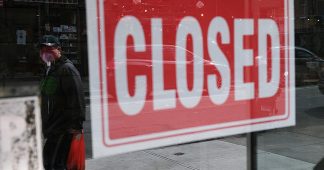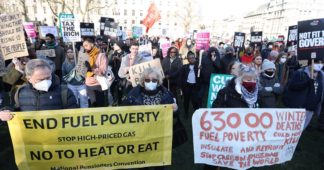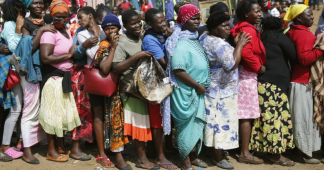“Without immediate radical action, we could be witnessing the most profound collapse of humanity into extreme poverty and suffering in memory,” said the director of Oxfam International.
By Kenny Stancil
The combination of the coronavirus pandemic—prolonged by uneven access to vaccines, which is worsening material conditions in low-income countries—and Russia’s war on Ukraine, which has driven global food prices to record highs and contributed to a spike in energy costs, is threatening to push over a quarter of a billion more people into extreme poverty in 2022.
That’s according to Oxfam, which warned Tuesday in a new report that urgent international action, including canceling impoverished nations’ “unpayable” debt obligations and taxing the windfall profits of corporations along with the wealth of multimillionaires, is needed to prevent rising food and fuel costs from further exacerbating global economic hardship and inequality.
First Crisis, Then Catastrophe—published ahead of next week’s World Bank and International Monetary Fund (IMF) meetings in Washington, D.C.—shows that by the end of this year, 860 million people could be living in extreme poverty and 827 million people could be undernourished.
Before Russia’s invasion of Ukraine, the World Bank had projected that Covid-19 and intensifying inequality would increase the ranks of the extreme poor by 198 million in 2022. Building on research by the World Bank and the Center for Global Development, Oxfam now estimates that surging food prices alone will force an additional 65 million into extreme poverty this year, for a total of 263 million more people—equivalent to the combined population of the United Kingdom, France, Germany, and Spain—scraping by on less than $1.90 a day.
“Without immediate radical action, we could be witnessing the most profound collapse of humanity into extreme poverty and suffering in memory,” Oxfam International executive director Gabriela Bucher said in a statement. “This terrifying prospect is made more sickening by the fact that trillions of dollars have been captured by a tiny group of powerful men who have no interest in interrupting this trajectory.”
Roughly 3.3 billion people—”approaching half of humanity”—are expected to be living below the poverty line of $5.50 per day in 2022, according to Oxfam. The report adds:
“Meanwhile billionaire wealth has seen its biggest increase ever. Large corporations appear to be exploiting an inflationary environment to boost profits at consumers’ expense: soaring energy prices and margins have pushed oil company profits to record levels, while investors expect agriculture companies to rapidly become more profitable as food prices spiral. Moreover, low-income countries—their foreign reserves largely depleted by their Covid-19 responses and debt servicing—are dependent on a handful of grain exporting nations. The fragility and inequality of global food and energy systems is being profoundly exposed.”
As they “struggle now to cope with sharp cost-of-living increases, having to choose between eating or heating or medical bills, the likelihood of mass starvation faces millions of people” who are already suffering from malnutrition and other forms of deprivation, Oxfam notes.
As Common Dreams has reported, the situation is particularly dire in drought-stricken and war-torn countries such as Yemen—where the U.S.-backed, Saudi-led military assault has entered its eighth year—and Afghanistan, whose central bank reserves have been seized by the Biden administration. Tens of millions of people are also facing a growing hunger crisis in Egypt, Lebanon, Libya, Sudan, Syria, the occupied Palestinian territories, and in parts of East Africa.
Published at www.commondreams.org
We remind our readers that publication of articles on our site does not mean that we agree with what is written. Our policy is to publish anything which we consider of interest, so as to assist our readers in forming their opinions. Sometimes we even publish articles with which we totally disagree, since we believe it is important for our readers to be informed on as wide a spectrum of views as possible.











